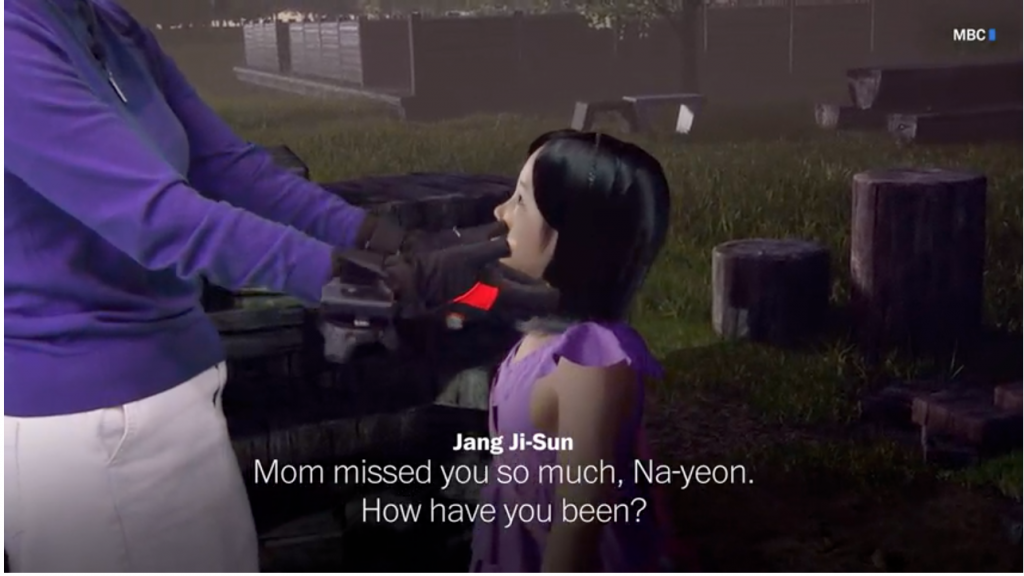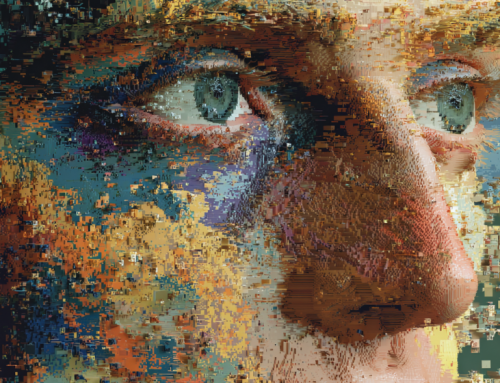
Korean company uses AI to create animations of deceased loved ones. (Source: film documentary ‘Meeting You’)
Multiple AI Platforms Address Creating Digital Personalities for Family Survivors
One of the most outrageous ways that AI has been used recently is for bringing about “eternal life”—digitally, at least—for people who have died. In a sci-fi frame of mind, people have long thought about using AI to download someone’s thoughts and personality before they pass away. A while back we carried a story about a Korean company that took the first step in that general direction.
The washingtonpost.com has published a story on grieving and how AI is being used to help people in the midst of their loss. In 2020, a Korean documentary team invited to its show a mother who had lost her 7-year-old daughter to an incurable disease. The girl’s death was so sudden — she died a week after being diagnosed in 2016 — the mother, Jang Ji-Sun, did not have a chance to say goodbye. For three years she was obsessed with the loss of her daughter.
The producers of the documentary, “Meeting You,” created a digitized re-creation of the child that the mother could see through a virtual reality headset (the TV audience was also able to see the image of the daughter). On the show, the virtual girl, Na-yeon, appeared from behind a woodpile and runs toward her mother, calling, “Mom.” The mother burst into tears and said, “Mom missed you so much, Na-yeon.” A video of the show reportedly received 19 million views. While the experience was painful, the mother told the Korean Times that she would do it again if she could; she finally got a chance to say goodbye. The Post article has the video of her experience if you would like to see it.
Can you put yourself in that woman’s position? Would you want to see the video as she did or would it increase the grief for you? A lot of questions remain to be asked about this entire concept.
This article goes on to highlight a few other examples of AI being used to bring about a reunion with deceased family members. And the approaches are compassionate and yet remain more machine than human.
“It’s something that’s very fundamental to humans, to keep a connection to something they loved,” said Sherman Lee, a psychology associate professor at the Christopher Newport University in Newport News, Va., and director of the Pandemic Grief Project.
New Connections With AI
Some of the other platforms we mentioned have had similar goals in mind but use completely different approaches.
Hossein Rahnama, a professor at Toronto Metropolitan University and a research affiliate with MIT Media Lab, has been building a platform called Augmented Eternity, which allows someone to create a digital persona from a dead person’s photos, texts, emails, social media posts, public statements and blog entries that will be able to interact with relatives and others.
“In June, Amazon unveiled a new feature it’s developing for Alexa, in which the virtual assistant can read aloud stories in a deceased loved one’s voice after just hearing a minute of that person’s speech. (Amazon founder Jeff Bezos owns The Washington Post.) “While AI can’t eliminate that pain of loss, it can definitely make their memories last,” said Rohit Prasad, senior vice president and head scientist for Amazon Alexa.”
Several entrepreneurs in the AI sphere, including James Vlahos of HereAfter AI and Eugenia Kuyda, who co-founded AI start-ups Luka and Replika, are developing means of creating virtual representations of people, using data from their digital footprint to craft an avatar or chatbot that can interact with family members after they’ve passed.
This may be a sensitive article for those who are experiencing the recent loss of a family member. For others, it might give some hope for the future to keep their loved ones as close as is humanly possible after they have gone. The article doesn’t show eternal life is possible. It shows that AI might hold some of the answers for grieving. But certainly not all of them.
read more at washingtonpost.com







Leave A Comment